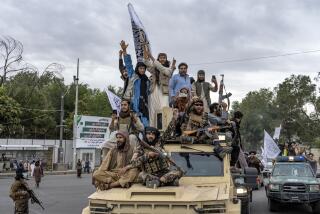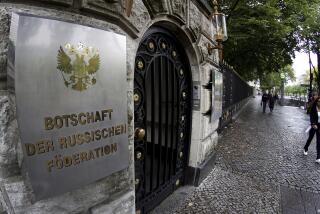Italy to Reduce Libyan Mission, Restrict Travel
- Share via
ROME — The Italian government announced Saturday that it will reduce the number of Libyan diplomats in Italy and restrict their travel, steps similar to those taken by other member nations of the European Communities.
The announcement came after a bomb rocked the British Bank of the Middle East in Beirut’s Muslim-controlled sector. Shortly afterward, a caller told a radio station that the blast was in retaliation for Britain’s role in the U.S. attack against Libya.
The Italian government’s measure will cut the number of Libyan diplomats in the country by 10, according to a Foreign Ministry official, who spoke on condition of anonymity. Libyan diplomats, now estimated to number about 40, would have to receive special permission to travel outside the province in which they live, he said.
The official told a reporter that the move was “an act of coordination” with policies adopted at recent meetings of the 12-member Common Market.
The Common Market decided Monday to reduce the number of Libyan diplomats in Europe and restrict those remaining to their assigned cities. Other Libyan entities, such as airline and trade offices, are to be examined with a view to reducing the number of employees.
The Common Market’s governing council has said Libya is involved in sponsoring terrorism.
U.S. planes bombed the North African Arab country April 15, and President Reagan said the attack was conducted because of Libya’s involvement in international terrorism. Libya, denying the charge, has vowed to retaliate.
The Italian statement said the Rome government is studying the possibility of reducing its diplomatic staff in Libya, which numbers several dozen. Italy represents British and Irish interests in Tripoli.
Several hundred Italians have left Libya since the U.S. air raid.
In Beirut, police said the bomb that exploded at the British Bank of the Middle East contained 33 pounds of TNT and caused extensive damage but injured no one.
The 4:10 a.m. blast wrecked the bank entrance on the ground floor of a seven-story building off West Beirut’s busy Hamra Street, demolishing doors, desks and counters and blowing out windows in the area.
A previously unknown organization called Group 219 FA claimed responsibility in calls to two radio stations.
The blast was in “retaliation for Britain’s complicity in the U.S. aggression against Libya,” one station quoted the caller as saying.
British Prime Minister Margaret Thatcher allowed U.S. F-111s based in Britain to be used in attacking Tripoli and Benghazi.
British employees of the bank have left West Beirut in fear of terrorist reprisals following the air raids, as have dozens of other Westerners.
Earlier this month, an American and two Britons who had been kidnaped in Beirut were found dead. A note with the bodies said they were killed in retaliation for the attack on Libya.
The explosion came hours after a bomb exploded at the American Express office in Lyon, France, touching off a fire and slightly wounding one person with flying glass.
There was no immediate claim of responsibility, but police found an inscription daubed in red paint on a wall near the office reading, “Black & Decker, Control Data, American Express, U.S. Go Home.”
Other developments Saturday:
--Libyan television, monitored by the British Broadcasting Corp., said the Kadafi regime will take action in response to Common Market sanctions, but it did not specify the action.
The Libyan Foreign Ministry in Tripoli summoned a number of Common Market envoys, the broadcast said, telling them that Libya has no links with terrorists and declaring that the European sanctions can only be viewed as “submission to U.S. pressure.”
--French Premier Jacques Chirac and Italy’s Prime Minister Bettino Craxi agreed on the need to step up the fight against international terrorism, Italian government officials said.
More to Read
Sign up for Essential California
The most important California stories and recommendations in your inbox every morning.
You may occasionally receive promotional content from the Los Angeles Times.













